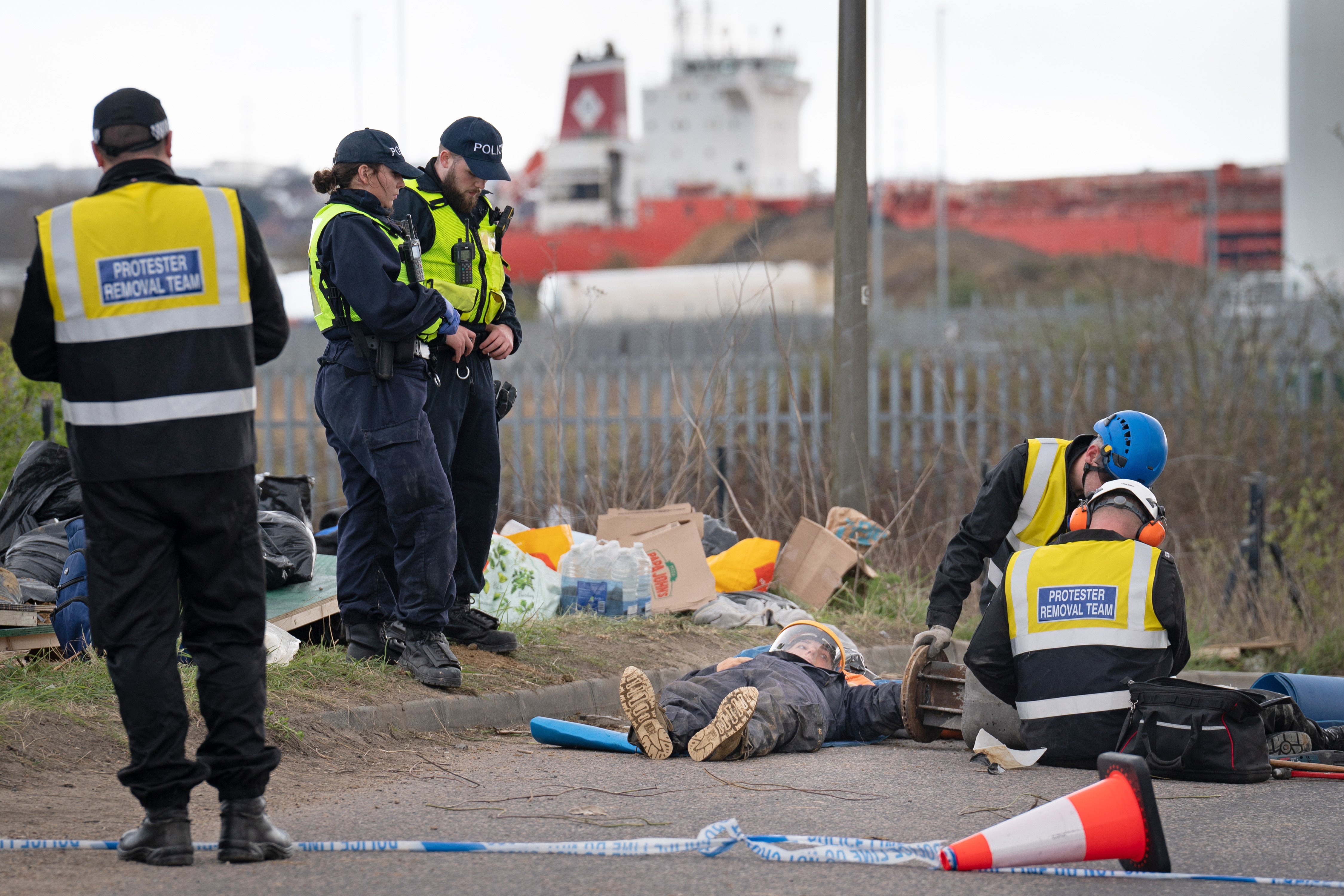
Police have warned that “exceptionally dangerous” fuel protests are putting activists and officers at “unacceptable” risk of harm, as climate activists claimed to have disrupted oil supplies at three terminals on their 10th day of action.
In Warwickshire, activists dug a tunnel through the night – concealed by a modified caravan parked on the roadside – “under a key tanker route” to a BP terminal.
At 2:30am on Saturday, around 40 protesters blocked the entrance to a terminal in Hertfordshire by “locking on” to the gates.
A similar number of activists stormed a facility in Essex, climbing the loading bay pipework and locking on.
Just Stop Oil – which is demanding that the government ends new oil and gas projects in the UK – said it expected its actions with Extinction Rebellion would “continue to significantly impact on fuel availability at petrol pumps” across the Midlands and southeast England.
The government insisted that “all supply points are operational except one”, but – amid reports of petrol stations running dry in the south – conceded that the protests had “led to short-term disruptions to fuel deliveries over the past few days”.
Police and industry were working together to ensure fuel supplies “can be maintained”, a government spokesperson said.
In Essex, where 338 arrests have so far been made, police warned that Sunday’s protest was “exceptionally dangerous” due to the location of protesters on the site.
“We cannot stand by while criminal acts are being committed, and lives are being put at risk, in the name of protest,” said Assistant Chief Constable Glen Pavelin, of Essex Police.
“We are not anti-protest. Our job is to preserve life and catch criminals, and that’s what we’re going to do. Today’s protest is exceptionally dangerous due to where the protesters have located themselves within the site.
“Our officers have been diligent in ensuring that all protesters know the risks involved, and we’ve been working hard to minimise the dangers this morning. Put simply: we don’t want anyone to get hurt.”
The force said that policing the protests in Thurrock had cost it “in excess of £1m”.

It came as Extinction Rebellion activists staged sit-in protests in central London for a second day, blocking two bridges to demand an end to the fossil fuel economy, and spray-painting red hands outside the corporate offices of oilfield services firm Schlumberger.
Hundreds of demonstrators gathered at Speakers’ Corner at Hyde Park, before marching into the city centre and splitting up to occupy both Lambeth and Vauxhall bridges, preventing vehicles from crossing the major traffic arteries across the Thames.
Crowds sat in the middle of the road, waving multicoloured flags bearing the group’s symbol and placards that read “there is no planet B”. They listened to speakers and music in sunny weather.
Demonstrators allowed ambulances and fire engines to cross, with organisers parting the crowd by shouting “blue light”.
But blockade of ordinary traffic continued on Vauxhall Bridge until after 7pm, with a samba band continuing to play.
The remaining demonstrators were removed and in some cases arrested by police, who imposed a section 14 order allowing them to clear the protesters.
It came after thousands of Extinction Rebellion protesters flooded the capital’s streets on Saturday for a first day of mass action, blockading roads around Oxford Circus and Trafalgar Square. The group has vowed to “block areas of the city for as long as possible” every day for at least a week, and on the next three weekends.
The activist group plans to recruit new “rebels” and hold training in non-violent action and resistance tactics in Hyde Park in the mornings before marching into the city centre “en masse”, it said on its website.
“Our disruption will not stop until the fossil fuel economy comes to an end,” it said.

Activist and student Kiri Ley, 21, from Birmingham, said: “I know that very often people will question our tactics about disruption for example, to ordinary people, stuff like roadblocks, like gluing on, locking on, and so on.
“What I would ask people, if you make that criticism, is what actually do you suggest that we do?
“We tried all the other methods – we've written letters, we've marched, we've spoken to our MPs, we've done literally everything we can and time and time again we see them doing completely the opposite of what the scientific evidence says and this is what is left to us, really, we do it because we know it works.”
Her comments echoed those of Green Party MP Caroline Lucas, who said that while some Extinction Rebellion protests are counterproductive, their disruptive actions are the “only way that people feel they can make their voices heard”.
“I think that being on the streets of London has been shown to be a way of capturing people’s imaginations. People have joined those protests who have never protested before. They are doing it because they know we have to leave new fossil fuels in the ground,” Ms Lucas told the BBC’s Sunday Morning show.
“The International Energy Agency says that, the latest IPCC report says that and yet this government and this energy strategy ... is foreseeing getting out even more oil and gas from the North Sea.
“That is frankly immoral and said the UN general secretary said that is frankly both morally and economically mad.”
Additional reporting by PA







